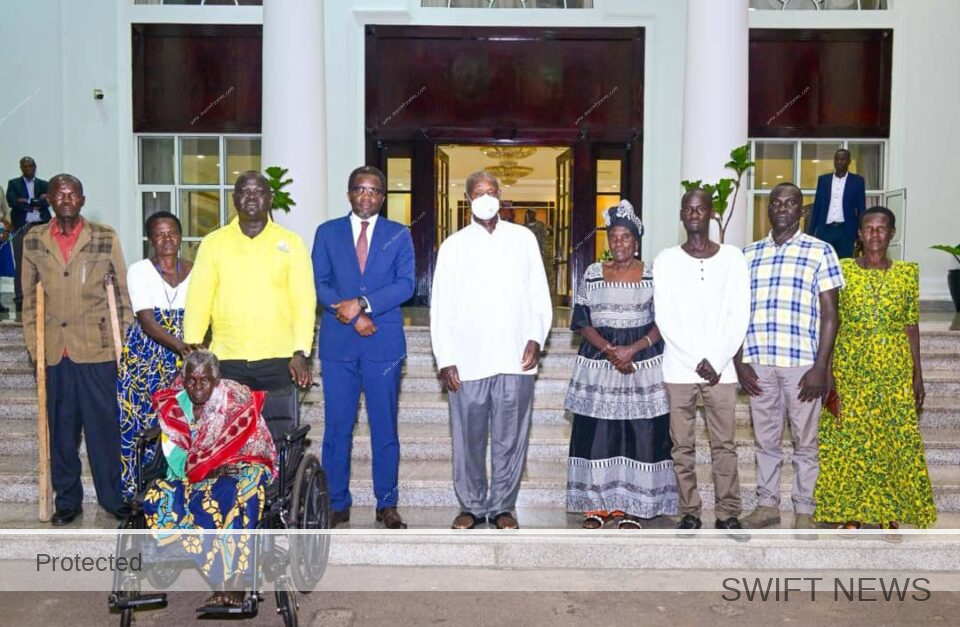
By Our Reporter
In a powerful moment of historical reckoning, President Yoweri Museveni has extended a hand of reconciliation to the family of Francis “Hitler” Eregu, a former rebel commander who once led an armed insurgency against the very government Museveni heads.
The encounter — held Thursday at State House Entebbe — was more than a meeting; it was a symbolic gesture that blurred the lines between former enemies and a nation’s quest for healing.
Eregu, a fearsome leader of the Uganda People’s Army (UPA) during the 1986–1994 rebellion in Eastern and Northern Uganda, died in combat with Museveni’s National Resistance Army (NRA). His name long evoked fear, resistance, and ultimately, erasure — until now.
In an unexpected yet poignant twist of fate, Museveni met with Eregu’s surviving family members, including his 102-year-old mother, Angela Aero, widows Joyce Ajiko and Aisha Namutebi, and a number of children and siblings. Many of them have lived in poverty and social isolation for decades, stigmatized by their link to a man once branded a national enemy.
“If Eregu had been alive, I would have offered him a role to serve this country, just like I have done with others,” Museveni said, his tone reflective rather than confrontational. “It is unfortunate he died while in the struggle. But in his memory, I will stand with his family.”
This meeting, long unthinkable, marked the first formal recognition by the State of the hardship endured by Eregu’s family — a subtle but powerful rewriting of Uganda’s post-war narrative.
A Family Resurfaces
For years, the Eregu family lived in near-total obscurity. Their descent into poverty followed the collapse of UPA and the violent death of its leader. His son, Jude Engulu, now 33, dropped out of school due to lack of funds. His dream is simple but telling: “I just want to work and make my father proud.”
The family’s hidden plight was brought to light by Calvin Echodu, an NRM figure in Eastern Uganda, who quietly helped construct a basic house for Eregu’s aging mother and lobbied officials to take notice. His efforts reached Kenneth Omona, Minister for Northern Uganda, and Augustine Otuko, the President’s Private Secretary for Political Affairs — leading to Thursday’s momentous meeting.
Not Just Compensation — Restoration
What followed was not just a promise of material relief, but a moral shift. Museveni pledged to build the family a permanent home, construct rental units for the widows to generate income, and fund a poultry farming project for Eregu’s children.
But the real currency exchanged wasn’t land or money — it was recognition. For the first time, a president who once fought to annihilate Eregu’s cause now called his surviving kin partners in national healing.
“Supporting the family of Eregu is not just charity,” Museveni said. “It’s a recognition that the past, no matter how painful, must not dictate our future. It’s about building unity from our divisions.”
The Weight Of History
Francis Eregu’s insurgency wasn’t an isolated burst of violence. It was rooted in deep discontent in the Teso and Lango sub-regions, where demobilization, marginalization, and broken political promises bred rebellion. The UPA, made up of ex-soldiers from the fallen Uganda National Liberation Army (UNLA) and local fighters, became a conduit for resistance — and vengeance.
The NRA eventually defeated the rebellion, but not without scars. Villages were razed, families torn apart, and memories of betrayal left to fester. For decades, many in Eastern Uganda lived with the psychological fallout of a war that remained unresolved.
Museveni’s gesture may not erase that pain, but it reframes it. For observers, the move is as much about political legacy as it is about personal conviction.
“It’s not about politics anymore,” said a senior aide familiar with the encounter. “It’s about legacy. It’s about peace.”
A Larger Reconciliation Effort
Thursday’s meeting echoes similar initiatives by Museveni in recent years — quietly meeting former rebels, integrating opposition fighters, and publicly supporting reintegration. But few gestures have been as emotionally charged as this: embracing the family of a man once committed to your downfall.
As Uganda grapples with generational trauma, the move hints at a leadership trying to write its final chapters in peace, not conflict.
Whether symbolic or strategic, the message is clear: no wound is too old to heal, no enemy too distant to forgive.
For the Eregu family, the day was not just a return to national consciousness — it was an opportunity to reclaim dignity lost to history. For Uganda, it was a rare and fragile moment when politics paused to make way for humanity.
In the twilight of Museveni’s rule, such moments may well define his legacy — not as the man who defeated rebels, but as the one who embraced their children.

